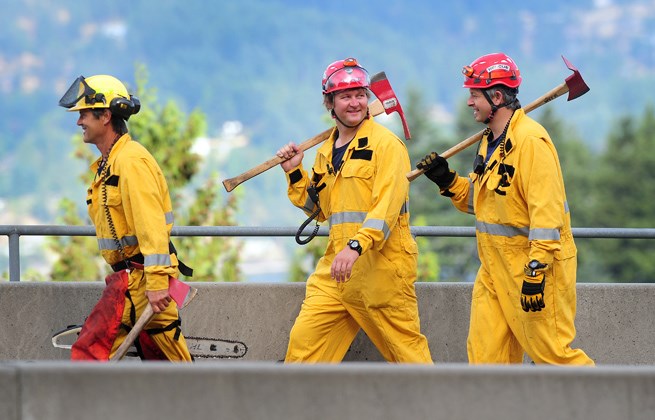Extremely dry conditions and careless behaviour have the local and provincial firefighters pleading for public caution as risk of wildfires grows.
West Vancouver firefighters have put out 12 brush fires in eight days and conditions are set to get worse before they get better.
“The North Shore looks predominantly extreme except for the very point that goes out to B.C. Ferries’ (terminal) at Horseshoe Bay,” said Marg Drysdale, fire information officer with the Coastal Fire Centre.
It so happens that was the location of a stubborn brushfire that threatened to become something far worse on Tuesday afternoon.
West Vancouver Fire and Rescue Services and the province’s Wildfire Management Branch were on the scene just north of Horseshoe Bay overnight, working to tamp down the blaze.
“They’re hitting the hot spots, digging, turning up the dust and soaking it down, just making sure we don’t get a rekindle,” said assistant fire chief Jeff Bush on Wednesday afternoon.
The fire spread to an area of more than nine square metres and threatened to become a “Rank 3” as it was starting to burn up the trees, Bush added. Had conditions been much dryer — and they currently are getting worse by the day — “it would have gone up like there’s no tomorrow,” Bush said.
With no natural causes likely, the Horseshoe Bay fire, like all the others, was almost certainly caused by a flicked cigarette or other improperly discarded smoking material.
“There’ve been several fires where we’ve found the remains of cigarette filters,” Bush said.
Making matters worse, another ridge of high pressure is blowing in from the western United States, bringing with it much warmer than normal conditions for this time of the year, according to Environment Canada meteorologist Andre Besson.
Temperatures are expected to reach the low 30s Celsius over inland sections of the Lower Mainland and the high 20s closer to the water. And if you want to be reminded what 40 C feels like, you can head to the Interior.
More than heat and dryness, the weather system brings another unwanted risk.
“Eventually that ridge will break down and we’re looking at very unstable conditions with potential for dry lightning at the end of this warm spell,” Bessson said.
Smoking is not allowed in West Vancouver or Metro Vancouver parks and charcoal barbecues and fireworks have been banned during the dry period. As of noon on Saturday, all campfires on Crown land in the backcountry are also prohibited. Violating the ban can result in a $345-ticket, a fine ranging between $10,000 and $100,000 or a year in jail. If an illegal fire contributes to a wildfire, the person responsible may be held ordered to pay the entire cost of fighting the fire.
Beyond urging residents to only dispose of smoking material in ashtrays, Bush is asking the public for vigilance.
“If you see smoke in the wild areas, call us immediately. If we can get a jump on a fire in its early stages, that makes our job a lot easier,” he said.
Metro Vancouver isn’t yet considering closing any of its backcountry hiking trails, but staff are monitoring the weather and fire risk.



